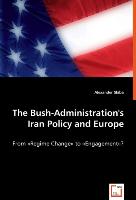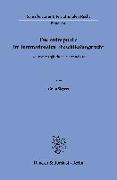The Bush-Administration's Iran Policy and Europe
BücherAngebote / Angebote:
In the wake of the 2003 Iraq war, the Iranian nuclear crisis evolved as the most pressing security challenge for the United States and its European allies. While the first Bush administration seemed to embark on a collision course with Europe, the second Bush cabinet started to support the EU-led multilateral negotiation effort with Iran. This support--tacit at first--climaxed in May 2006, when Condoleezza Rice declared Washington's readiness to join multilateral negotiations with Iran. This book shows that the Bush administration was unable to formulate an autonomous--i.e. unilateral--Iran policy according to its original policy preferences of containment and isolation. The shifts in U.S. foreign policy can be best explained by a combination of three factors: First, America's freedom of action was limited following the Iraq War which put a drag on U.S. military, economic and political power. Second, a streamlining process within President Bush's foreign policy staff following the elections of 2004 set the stage for gradual adjustments. Third, the growing influence of Germany (as part of the EU-led diplomatic effort) supported the «multilateralization» of Washington's Iran policy.
Folgt in ca. 5 Arbeitstagen




